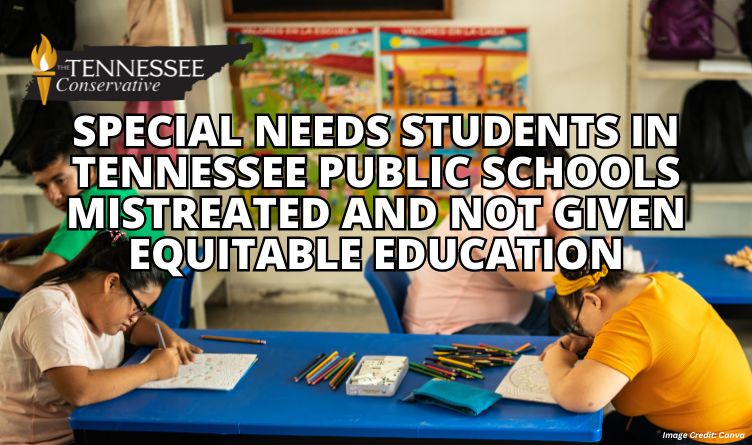Image Credit: Canva
The Tennessee Conservative [By Paula Gomes] –
Special needs students in Tennessee’s public schools are being mistreated and in many cases, not receiving an equitable education.
After reporting in April about Jacaira Crockett’s attempt to have her autistic 4-year-old son’s teacher terminated by Clarksville-Montgomery County Schools, another child in Clarksville has been identified as having been on the receiving end of inappropriate treatment in the classroom.
Jasmine Hairston’s six-year-old special needs son Quinton Hunter Jr. returned home from Barkers Mill Elementary School with marks on his body several times over the course of almost a year. Quinton is autistic, non-speaking, and legally blind. He also has triplegic spastic cerebral palsy and requires a g-tube to eat.
Quinton’s grandmother, Coco Hairston, first saw the unusual marks on her grandson’s elbow and shoulder in November of 2023, noting that they were symmetrical, evenly apart and straight lines. Quinton’s mother found marks on him again three months in a row this year, in January, February, and March, but did not receive clear answers from her son’s teacher.
Quinton’s Individualized Education Plan (IEP) states that he is to have a one-on-one aide with him at all times through the school day, and yet Jasmine Hairston could not get anyone to tell her what had happened in the classroom for her son to receive these marks on his body.
“There should not be a day where somebody does not know,” said his grandmother. “He does not walk. He cannot stand on his own. He cannot see. There should not be a day where someone does not know what happens to him.”

When FOX 17 News contacted the school district regarding the family’s concerns, a spokesman said that the district had not been made aware of any substantiation of allegations but that district employees were trained annually on policies in relation to “Isolation and Restraint for Students Receiving Special Education Services.”
After filing many complaints to the Department of Children’s Services (DCS) and several police reports later, Quinton was eventually transferred by his family to a different elementary school. His mother reports that she is scared to let him out of her sight.
Jacaira Crockett, the Clarksville mother of another autistic, non-speaking boy, organized a demonstration at the school board earlier this year due to an incident in September 2023 between her son and a tenured teacher.
When her son came home from school pointing to his hair, Crockett initially did not realize anything was amiss, but later received communication from the school about a meltdown her son had earlier in the day in the cafeteria during which a teacher allegedly screamed in his face, pulled his hair, and covered his mouth as he screamed in order to “surprise him.”
While an initial investigation by DCS resulted in a finding of “without substantiation,” a new investigation prompted by a review from the District Attorney’s Office came back as “substantiated” and led to the teacher being reassigned to an “alternative work site.”
Some parents of special needs students are pulling their children from public school to homeschool instead.
In June, we reported that Knox County parents Robert and Jennifer Rose removed their 7-year-old son William from Beaumont Magnet Academy after fruitlessly working for increased access to therapy and additional accommodations.
While at the school, William had seizures that went unreported to his parents, and also suffered a fall from off a stage. His parents received no official notification about the incident.
According to a 2024 Special Education White Paper, the root causes leading to the needs of students with disabilities and behavior issues being ignored are:
• A shortage and high turnover of Special Education Teachers.
• Under-preparation and lack of resources for general and special education teachers working with students with behavior needs.
• Lack of access to effective school-based supports and therapies for students.
• Punitive and exclusionary state level and school level policy trends that end up targeting special needs students at disproportionate rates.

In light of this, it is perhaps unsurprising that data published by the Tennessee Department of Education from 2021-2022 shows that students with special needs are not receiving an education on par with their peers.
While Tennessee students graduated at a rate of 91.5% overall, students with an IEP for “emotional disturbance” graduated at a rate of only 38.5%. Less than half of autistic students in Tennessee public schools – 47.3% – graduated with a regular diploma.

About the Author: Paula Gomes is a Tennessee resident and reporter for The Tennessee Conservative. You can reach Paula at paula@tennesseeconservativenews.com.


